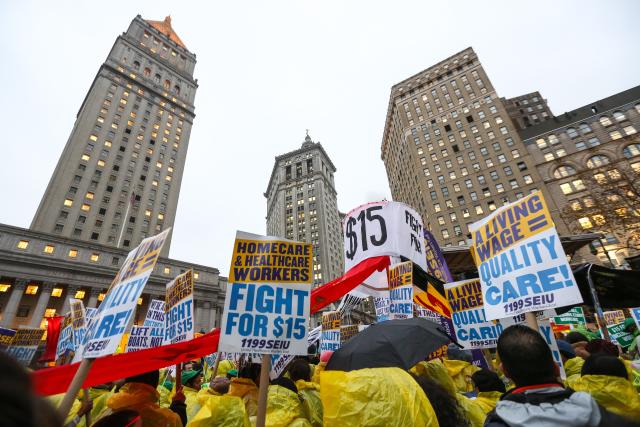When Nick Hanauer was just 7, his father made sure he and his brother knew every aspect of the family business. Afterschool and summer vacation activities included doing small jobs at the family’s Seattle-based pillow and down comforter company, Pacific Coast Feather. “I’m pretty deeply acquainted with what that kind of work is and what it’s like,” says Hanauer, “but I’ve [also] worked sort of doing all kinds of jobs in a variety of companies.”
Today, Hanauer is a self-made billionaire. He made his money as a serial entrepreneur and venture capitalist and has also created a broad array of companies ranging from e-commerce software to biotechnology. Hanauer’s business acumen has allowed him to become one of the wealthiest Americans — the so-called 1 percent — but it has also made him an unlikely champion of the poor and a passionate advocate for the advancement of economic equality in the U.S.
“If you’re a middle-class person and feel like the country has left you behind, that is an objective truth. That didn’t happen by accident.”
Hanauer is aware that some form of economic inequality is an essential part of a healthy economy. “That’s not in dispute,” he says. The question, however, is how much of it should exist. In the late 1970s, the richest 1 percent of Americans shared only about 8 percent of the national income. By 2007, however, that number had grown to almost 23 percent, while the income share of the bottom 50 percent had fallen from about 20 percent to about 12 percent in 2015.
“It doesn’t take a mathematical genius to see that if that trend continues, we will no longer have really a capitalist economy or a democracy,” notes Hanauer. He believes there are multiple factors contributing to the probleme: trickle-down tax policies, dwindling overtime pay and decreasing wages. “There is no excuse for any company in America to pay their workers so little that they need food stamps, and Medicaid and rent assistance,” explains Hanauer. “This is bulls***.”
“That’s not capitalism. That’s socialism for the rich.”
According to Hanauer, all businesses share the same “econo-erotic fantasy”: “My customers will all be rich and be paid a lot by their employers. My workers, sadly, will not be paid a lot, so my margins are very high. I’ll exist in this world where my workers need food stamps, sadly, but my customers are wealthy enough to both buy my stuff and pay the taxes that will fund the food stamps.” Hanauer appreciates the appeal of the fantasy, but there is one problem: “If everybody gets that deal, then you have no economy anymore.” However, Hanauer believes this crisis is a direct result of “policies enacted by governments from both the right and left.”
When President Trump signed the GOP tax bill on December 20, 2017, he touted it as the coming of “jobs, jobs, jobs.” And while Republicans have said that the bill will benefit the middle class and spark job growth by giving corporations permanent tax cuts, Hanauer says that those claims are far from the truth. “Rich people no more create jobs than farmers create tomatoes. The economy generates jobs, not rich people,” he explains. “The more money consumers have, the more jobs that are created, because people buy things and people like me are required to hire people in order to meet that demand.”

In order for those consumers to get the money needed to buy the products, they would have to have that money in the first place — which is why Hanauer believes every state should institute a $15 minimum wage, which he successfully lobbied for in the state of Washington. “The idea that raising wages kills jobs lies in the face of all common sense. If people don’t have any money, who will buy the stuff?” And even though Hanauer was one of the first investors in Amazon, he holds Jeff Bezos to the same standard he would to any CEO who runs a successful business empire. “Until we collectively raise standards so that we require Jeff Bezos to pay his workers enough to get by without food stamps, it’s not his obligation to do that unilaterally,” he says. “Certainly, that’s not what Walmart is doing, or Walgreens, or any of his competitors … and I think that’s a problem.”
The availability of overtime is another area Hanauer believes should be a key labor protection for the middle class: In 1975, more than 65 percent of salaried American workers earned time-and-a-half pay for every hour worked over the week’s allotted 40 hours. By 2013, however, only 11 percent of salaried workers qualified for overtime pay — which means employees can be made to work over 40 hours a week without getting paid their time and a half. Hanauer says this causes more jobs to be taken out of the economy and a softening of the labor market, making it harder for workers to negotiate higher wages. He explains, “If you do that 30, 40, or 50 million times across the economy, you have turned three jobs at 40 hours a week into two jobs at 60 hours a week, millions of times. That’s a way to … take 20 million jobs out of the economy.”
Ultimately, Hanauer believes people should call their elected representatives and demand policies that create wage-and-overtime increases and reject cutting taxes for wealthy corporations, “[Don’t] get conned by this trickle-down nonsense that raising wages kills jobs — It doesn’t. It’s just a thing rich people say to poor people to keep rich people rich and poor people poor.”
“It’s a lie. Don’t believe it.”

No comments:
Post a Comment